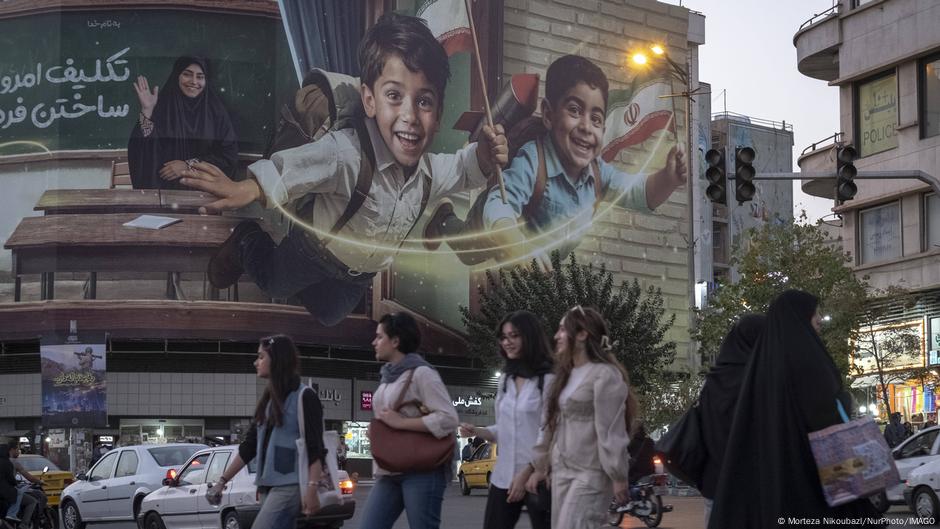Daily life under soaring inflation, rising unemployment, and vanishing opportunities has become for many young Iranians.
Across cities and towns in , the younger generation faces a reality where dreams are deferred, , and the future grows more uncertain.
“My city used to be beautiful, but now it’s become lifeless. All my friends are leaving,” Elnaz* a Gen Z Iranian told DW.
“I wish our worries about inflation and high prices would turn into concerns about whether to spend summer vacation in our own city or travel around Iran,” she said.
Elnaz has spent the past few years working toward financial independence by training for two different jobs. But she said work has dropped off in recent months and the return of international sanctions over .
“Among people my age, those with family support are doing better. But for people like me, there’s no hope. I envy young people in other countries — their worries aren’t even close to ours.
Young Iranians struggle to find work
Despite official claims of a 7.6% unemployment rate, a closer look at Iran’s labor market tells a grimmer story — especially for youth and women. Nearly 1 in 5 young Iranians are unemployed.
For millions, , with some estimates showing 80% of households earning below the global poverty line.
Young Iranian Bita* describes daily life with quiet frustration.
“The prices are unbelievable and change by the day. Even with two incomes in our household, we can barely afford basic groceries, which are not even enough,” she told DW.
“Buying things like clothes, shoes, or anything extra is nearly impossible. Meat, chicken, fish, and even rice can’t all be bought in the same month. We need to spread them out over several months,” she said.
Bita is also a pet owner, which adds more pressure to her budget.
“Even pet food prices have skyrocketed. Many pet owners are giving their animals away because they just can’t afford to keep them. Even these poor animals have seen their quality of life go down.”
War and sanctions
In June, Iran’s already fragile economy was shaken further during a 12-day conflict with Israel.
For ordinary Iranians, the impact was immediate. Prices soared further, and fear of wider escalation set in.
The over Iran’s nuclear weapons program has added to , and many Iranians fear the worst is yet to come.
Bita described the mood after the conflict as a mix of anger and despair.
“Some people are very optimistic and hopeful. Others are completely hopeless and pessimistic. Some are waiting for help to come from outside, while others are strongly against any kind of foreign intervention. The divisions run deep.”
Amin*, a young man, told DW there is quiet but widespread public anger simmering beneath the surface.
“What you hear most is pure despair — especially among the youth. The lack of any clear future or opportunity for growth hits them the hardest, and their frustration is more visible. You often hear people so desperate, they start to see war or even death as a kind of escape.”
Amin believes that the will be directly responsible if another war breaks out.
He believes Iran’s rulers have refused to compromise and continued to block any possibility of dialogue or cooperation with the international community. In the event of another conflict, not only will there be no public support, but even supporters of the regime may begin to turn away, he said.
“The regime’s dominant narrative — that foreign threats would unify the people — has already lost credibility. In the next war, that illusion will crumble even further,” Amin said.
These young Iranians say they worry that ordinary people will bear the brunt of any future conflict, which would threaten the stability and livelihood they still have. If war breaks out again, Iran may become a broken, bankrupt country — with no reform, no change, and nothing left to rebuild.
Iran’s Gen Z holds out hope
Years of political repression, economic hardship, and social restrictions have pushed many young Iranians to leave the country.
Those who have already left have studied, worked, and experienced personal freedoms that have become unimaginable back home — the ability to speak freely, to plan a future, and to build a life without fear.
Still, many say that if conditions improve, they will come back to Iran to help rebuild.
“My greatest wish is to be able to embrace someone very dear to me, whom I’m separated from because of all this, here in our own country,” Elnaz said, referring to a family member living abroad.
Bita shares similar hopes.
“I carry deep regrets in my heart and never thought that, approaching middle age, I would be burdened with so much stress and anxiety. Personal dreams have faded — now, my only wish is for freedom, prosperity, and economic revival in our homeland.”
*Names and identities have been changed for safety reasons
Edited by: Wesley Rahn
The post Iran’s Gen Z cornered by crackdowns, sanctions, and conflict appeared first on Deutsche Welle.




